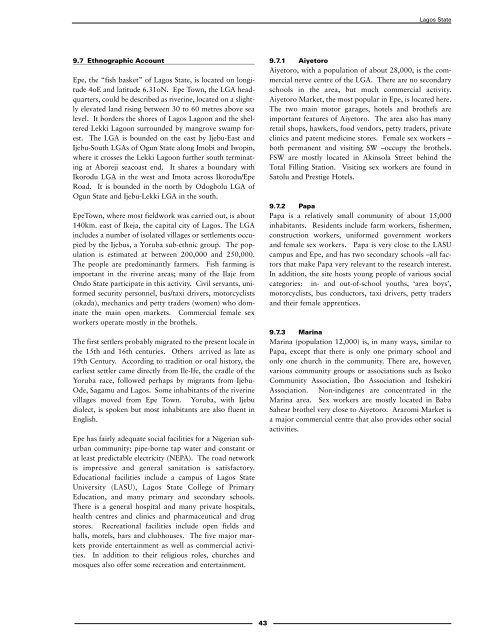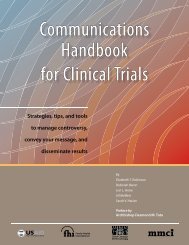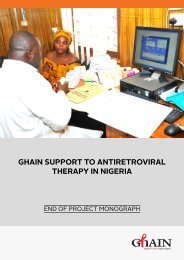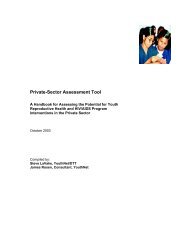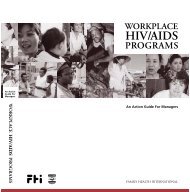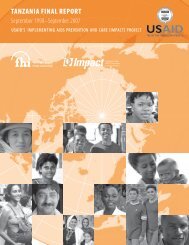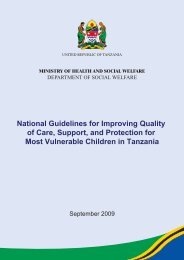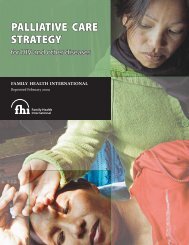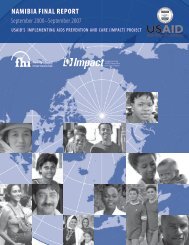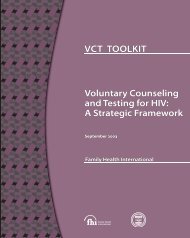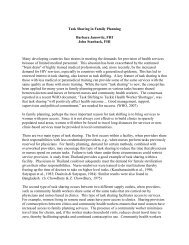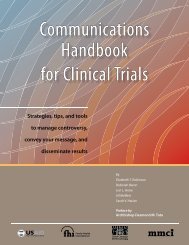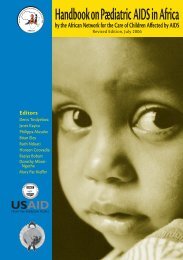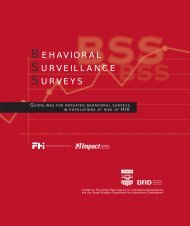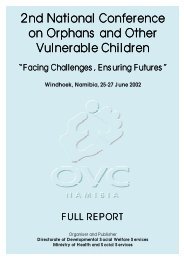Lagos State, Nigeria - Family Health International
Lagos State, Nigeria - Family Health International
Lagos State, Nigeria - Family Health International
Create successful ePaper yourself
Turn your PDF publications into a flip-book with our unique Google optimized e-Paper software.
9.7 Ethnographic Account<br />
Epe, the “fish basket” of <strong>Lagos</strong> <strong>State</strong>, is located on longitude<br />
4oE and latitude 6.31oN. Epe Town, the LGA headquarters,<br />
could be described as riverine, located on a slightly<br />
elevated land rising between 30 to 60 metres above sea<br />
level. It borders the shores of <strong>Lagos</strong> Lagoon and the sheltered<br />
Lekki Lagoon surrounded by mangrove swamp forest.<br />
The LGA is bounded on the east by Ijebu-East and<br />
Ijebu-South LGAs of Ogun <strong>State</strong> along Imobi and Iwopin,<br />
where it crosses the Lekki Lagoon further south terminating<br />
at Aboreji seacoast end. It shares a boundary with<br />
Ikorodu LGA in the west and Imota across Ikorodu/Epe<br />
Road. It is bounded in the north by Odogbolu LGA of<br />
Ogun <strong>State</strong> and Ijebu-Lekki LGA in the south.<br />
EpeTown, where most fieldwork was carried out, is about<br />
140km. east of Ikeja, the capital city of <strong>Lagos</strong>. The LGA<br />
includes a number of isolated villages or settlements occupied<br />
by the Ijebus, a Yoruba sub-ethnic group. The population<br />
is estimated at between 200,000 and 250,000.<br />
The people are predominantly farmers. Fish farming is<br />
important in the riverine areas; many of the Ilaje from<br />
Ondo <strong>State</strong> participate in this activity. Civil servants, uniformed<br />
security personnel, bus/taxi drivers, motorcyclists<br />
(okada), mechanics and petty traders (women) who dominate<br />
the main open markets. Commercial female sex<br />
workers operate mostly in the brothels.<br />
The first settlers probably migrated to the present locale in<br />
the 15th and 16th centuries. Others arrived as late as<br />
19th Century. According to tradition or oral history, the<br />
earliest settler came directly from Ile-Ife, the cradle of the<br />
Yoruba race, followed perhaps by migrants from Ijebu-<br />
Ode, Sagamu and <strong>Lagos</strong>. Some inhabitants of the riverine<br />
villages moved from Epe Town. Yoruba, with Ijebu<br />
dialect, is spoken but most inhabitants are also fluent in<br />
English.<br />
Epe has fairly adequate social facilities for a <strong>Nigeria</strong>n suburban<br />
community: pipe-borne tap water and constant or<br />
at least predictable electricity (NEPA). The road network<br />
is impressive and general sanitation is satisfactory.<br />
Educational facilities include a campus of <strong>Lagos</strong> <strong>State</strong><br />
University (LASU), <strong>Lagos</strong> <strong>State</strong> College of Primary<br />
Education, and many primary and secondary schools.<br />
There is a general hospital and many private hospitals,<br />
health centres and clinics and pharmaceutical and drug<br />
stores. Recreational facilities include open fields and<br />
halls, motels, bars and clubhouses. The five major markets<br />
provide entertainment as well as commercial activities.<br />
In addition to their religious roles, churches and<br />
mosques also offer some recreation and entertainment.<br />
43<br />
<strong>Lagos</strong> <strong>State</strong><br />
9.7.1 Aiyetoro<br />
Aiyetoro, with a population of about 28,000, is the commercial<br />
nerve centre of the LGA. There are no secondary<br />
schools in the area, but much commercial activity.<br />
Aiyetoro Market, the most popular in Epe, is located here.<br />
The two main motor garages, hotels and brothels are<br />
important features of Aiyetoro. The area also has many<br />
retail shops, hawkers, food vendors, petty traders, private<br />
clinics and patent medicine stores. Female sex workers –<br />
both permanent and visiting SW –occupy the brothels.<br />
FSW are mostly located in Akinsola Street behind the<br />
Total Filling Station. Visiting sex workers are found in<br />
Satolu and Prestige Hotels.<br />
9.7.2 Papa<br />
Papa is a relatively small community of about 15,000<br />
inhabitants. Residents include farm workers, fishermen,<br />
construction workers, uniformed government workers<br />
and female sex workers. Papa is very close to the LASU<br />
campus and Epe, and has two secondary schools –all factors<br />
that make Papa very relevant to the research interest.<br />
In addition, the site hosts young people of various social<br />
categories: in- and out-of-school youths, ‘area boys’,<br />
motorcyclists, bus conductors, taxi drivers, petty traders<br />
and their female apprentices.<br />
9.7.3 Marina<br />
Marina (population 12,000) is, in many ways, similar to<br />
Papa, except that there is only one primary school and<br />
only one church in the community. There are, however,<br />
various community groups or associations such as Isoko<br />
Community Association, Ibo Association and Itshekiri<br />
Association. Non-indigenes are concentrated in the<br />
Marina area. Sex workers are mostly located in Baba<br />
Sahear brothel very close to Aiyetoro. Araromi Market is<br />
a major commercial centre that also provides other social<br />
activities.


